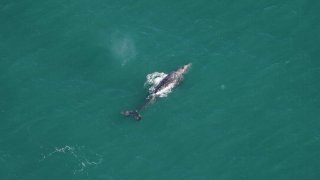
A rarely seen gray whale, extinct in the Atlantic Ocean, was spotted last week swimming off the coast of Nantucket, according to the New England Aquarium.
The species has been extinct in the Atlantic for more than 200 years.
WATCH ANYTIME FOR FREE
Stream NBC10 Boston news for free, 24/7, wherever you are. |
Aquarium scientists were flying 30 miles south of Nantucket on March 1 when they sighted the whale, which dove and resurfaced, apparently feeding.
The aerial survey plane circled the area for 45 minutes, allowing observers to capture photos of the animal. They later reviewed the images and were able to confirm that it was in fact a gray whale.
Get updates on what's happening in Boston to your inbox. Sign up for our News Headlines newsletter.

“I didn’t want to say out loud what it was, because it seemed crazy,” explained Orla O’Brien, associate research scientist at the New England Aquarium, who has been flying aerial surveys since 2011.
“My brain was trying to process what I was seeing, because this animal was something that should not really exist in these waters,” added Research Technician Kate Laemmle, who was also in the plane. “We were laughing because of how wild and exciting this was — to see an animal that disappeared from the Atlantic hundreds of years ago!”
Gray whales are regularly found in the North Pacific Ocean and are easily distinguished from other whales by the lack of a dorsal fin, their mottled gray and white skin and a dorsal hump followed by pronounced ridges. The species disappeared from the Atlantic Ocean by the 18th Century, but in the last 15 years there have been five observations of gray whales in Atlantic and Mediterranean waters, including off the coast of Florida in December.
Aquarium scientists said they believe the whale spotted last week off the coast of New England is the same one sighted in Florida late last year.
One explanation scientists have given for the return of the gray whale is climate change.
The Northwest Passage, which connects the Atlantic and Pacific oceans through the Arctic Ocean in Canada, has regularly been ice-free in the summertime in recent years. The extent of the sea ice typically limits the range of gray whales, experts say, as they cannot break through the thick winter ice that usually blocks the passage. But they are now able to travel the passage in the summer, something that wasn't possible in the previous century.
“This sighting highlights how important each survey is. While we expect to see humpback, right, and fin whales, the ocean is a dynamic ecosystem, and you never know what you’ll find,” O’Brien said. “These sightings of gray whales in the Atlantic serve as a reminder of how quickly marine species respond to climate change, given the chance.”



